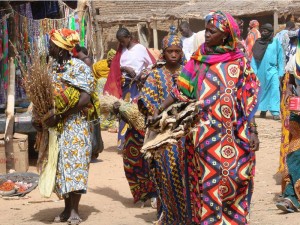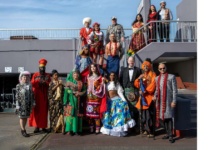The Tuareg inhabit the Saharan regions of North Africa – Niger, Mali, Libya, Algeria and Burkina Faso. Tuareg is an Arabic term meaning abandoned by God. They call themselves Imohag, translated as free men. No one knows the true origin of the Tuareg, where they came from or when they arrived in the Sahara. Reputedly of Berber descent, the language of the Tuareg is Tamachek, with their own script known as Tifinagh, thought to have ancient Libyan roots. Their numbers are unclear, but estimates run between 300,000 and 1 million. The Tuareg were recorded by the Greek historian Herodotus in the 5th Century BC.
Tuareg pastoralists are indigenous to three African countries: Algeria on the northern side of the Sahara, north-eastern Mali and central and northern Niger. There are negative connotations associated with the term Tuareg, an Arabic word meaning ‘the abandoned of God’, and they call themselves, Kel Tamashek, the people who speak Tamashek. Tamashek is related to ancient Libyan. The greatest number of Tuareg, around one million, live in Niger, mostly south and west of Air Massif, with smaller populations in Algeria, Mali and Libya.
The most striking attribute of the Tuareg is the indigo veil, worn by the men but not the women, giving rise to the popular name the Blue Men of the Sahara, or Men of the Veil. Men begin wearing a veil at the age 25.
One of the traditional dances of the nomadic Tuareg is the ‘Tam Tam’ where the men on camel circle the women while they play drums and chant. The huts of the Tuareg nomad are easily constructed, and comprised of weaved matting and tradition fabrics on a timber frame.
Tuareg society is highly stratified and consist of several castes; nobles, imajeren ‘the proud and free’; imrad, ‘free but subordinate’; ineslemen, the religious caste; ikelan, slaves who today live in neo-peonage, tending the palm groves and vegetable gardens of their masters. Inadin are an artisan caste of silversmiths living outside regular Tuareg society, which looks down upon their lifestyle. They wander from Tuareg encampment to encampment also serving as fortune tellers and medics. Additionally, the Tuaregs are split into various tribes: the Kel-Air, Kel-Gress, Iwilli-Minden, and the Immouzourak.
Although most Tuareg now practice some degree of Islam – the Maliki sect of Islam, resulting from the teachings of the great prophet El Maghili from the early 16th century – they are not considered Arabic. They have preserved many pre-Islamic traditions and do not strictly follow many Islamic rituals. Among the Tuareg the women have a great freedom and participate in family and tribal decisions. Descent and inheritance are both through the maternal line.
Tuareg camel caravans played the primary role in trans-Saharan trade until the mid-20th century when European colonial infrastructure – railways and roads – were introduced. Until then, there were five principal trade routes which extend across the Sahara from the northern Mediterranean coast of Africa to the great cities on the southern edge of the Sahara.
Tuareg began a continuous migration south-west in the seventh century with the Arab conquest of the Maghreb, arriving in Niger from the eleventh century onward. As the result of intense population pressure from this continuous migration they pushed resident Hausa communities southward and overran more sedentary groups. Extremely independent, the Tuareg formed a number of sultanates and converted to Islam but retained pre-Islamic customs.
In the eighteenth and nineteenth centuries the Tuareg extended control over desert trade and led resistance to French rule, and in the early twentieth century instigated a number of rebellions. At independence several top Tuareg chiefs in Niger and Mali attempted to form a federation to keep themselves outside the political control of the ‘black south’ but unlike in Mali, this agitation was not sustained in Niger.
Tuareg merchants were responsible for bringing goods from these cities to the north. From there they were distributed throughout the world. Because of the nature of transport and the limited space available in caravans, Tuareg usually traded in luxury items, things which took up little space and on which a large profit could be made.











